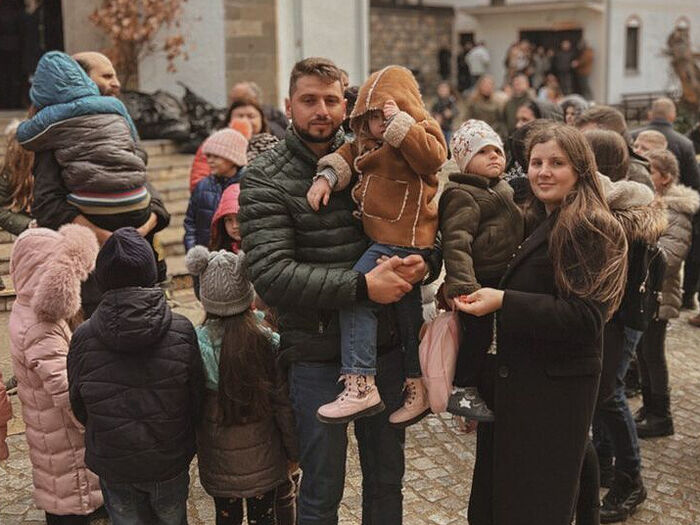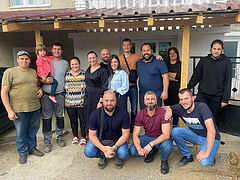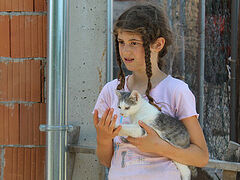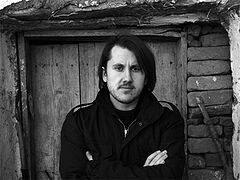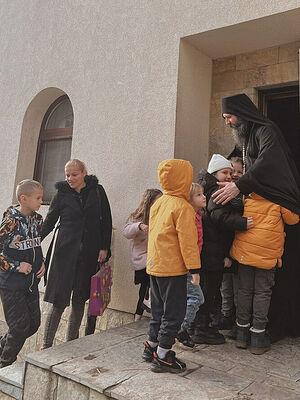 Visitors at the Draganac monastery It’s quiet in the monastery after the Monday morning liturgy. Birds are chirping in between the services—their singing soothes the tired worshipers. Surrounded by the woods, Draganac indeed feels like a big, warm nest. A nest where the birds and people tend to return—especially the young Serbs, who increasingly come to the monastery from afar or from the remaining neighboring Serbian villages. We asked Fr. Christopher, what does Draganac mean to people? Why is it so well loved by the Kosovo Orthodox? Does the monastery have the same or a different meaning for those who come here?
Visitors at the Draganac monastery It’s quiet in the monastery after the Monday morning liturgy. Birds are chirping in between the services—their singing soothes the tired worshipers. Surrounded by the woods, Draganac indeed feels like a big, warm nest. A nest where the birds and people tend to return—especially the young Serbs, who increasingly come to the monastery from afar or from the remaining neighboring Serbian villages. We asked Fr. Christopher, what does Draganac mean to people? Why is it so well loved by the Kosovo Orthodox? Does the monastery have the same or a different meaning for those who come here?
Everyone feels its holiness. I can see this. But each one feels it in his or her own way, of course. If they come from afar, they are probably more open-minded and will immediately notice certain differences. It is always like this: If we come to a new place, we are more observant and quicker to talk about our feelings. For me personally, every such revelation is another example of a good miracle that we can’t explain and no language in the world can help us. We cannot explain it, nor can we understand it—only rejoice. Well, of course, the monastery adheres to the rules of traditional monastic hospitality—every guest of ours is welcome, we will greet and offer food to everyone, just as we’ll speak with and pray for them. This has been our tradition since time immemorial. But there is also something that cannot be explained solely by a kind attitude towards pilgrims. Our young Serbs from the surrounding Serbian villages are also a well-kept secret. They come to Draganac continually, and they help us in all kinds of obediences. They are more inclined to remain silent than to talk; they will think ten times before saying something—that's how they were brought up. They come from different villages: Shilovo, Kusce, Koretishte, Priluzha, and Pasjane… But they come here as a family, as it is their own monastery, and this care is natural for them. That is why you won’t see any obvious enthusiasm in them—all they show is the joy from working quietly and peacefully for their own holy place.
The Serbian churches are filled with young people. People are looking for the meaning of life
—It sounds odd, but in our time, when the world is busy mocking and criticizing everything and everyone, our churches are full of young people, and more and more young pilgrims go especially to Kosovo. How can you explain it? What are these young people looking for?
—Well, in fact the Serbian churches in general are full of young people. And yes, you are right, more and more young people are coming to Kosovo and Metohija. People are looking for meaning. And what meaning is there for a Serb without Kosovo? That's how it happened to me at one point in time. There seemed to be no relatives of mine living here, but I felt like it was my native place. In this sense, Kosovo and Metohija are completely otherworldly places, totally incomprehensible. It has the spirit of blissful disobedience, of keeping the covenant, and a vivid perception that there is something greater and more important than we are probably accustomed to thinking.
It is somewhere above us, but it is also something that makes us feel complete as men: Holy Prince Lazar, Miloš Obilić, Milan Toplica, the Maiden of Kosovo, Holy King Stefan of Dečani, Gračanica, and St. Milutin, King of Serbia. Somehow Kosovo is calling us, the people of the twenty-first century, lost in the chaos of our restless and spiteful world. Kosovo helps us break through this hellish chaos to see the source of true light. Once you feel it, you will begin to realize that you have returned to yourself. Anything else the modern world has to offer (what it literally peddles to us) exudes death. Everything is so secondary, all those things like social progress, projects, “fake spirituality,” “the fight for the rights and equality,”—all this has been elevated to a cult, none of this will ever answer the main question that brings us to church: “What is the purpose of my life?” Once you find the answer, you will truly hear the message of the Church about Christ, the unprecedented event in history— God’s coming into the world for the sake of our salvation. You will hear about God crucified, and the Truth that there is no Resurrection without death, and there is no joy without Golgotha. It is a paradox, but deep in our hearts we all know it is true. So, when we learn about the Church, when we come to church, we will realize that we have found what we were looking for, even if we are possibly still unable to articulate our question clearly. Because man is a complex being. Even if we could explain to himself what we are looking for, we would walk to the nearest store and buy what we need. But we do not have such stores. And thank God that we don’t!
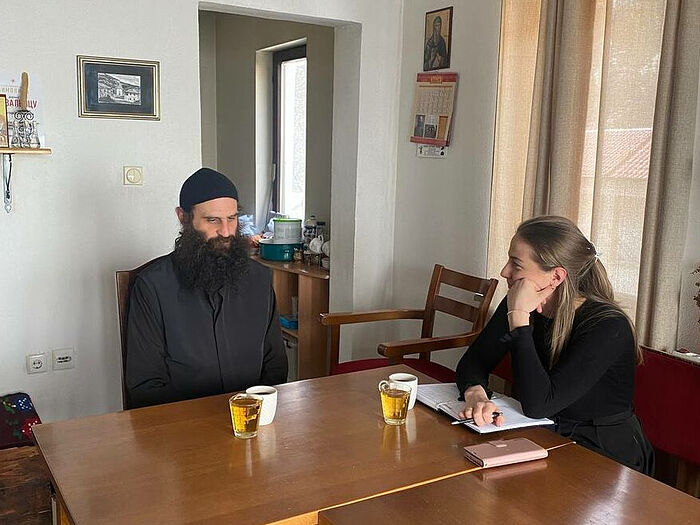 Fr. Christopher and Maria Vasic
Fr. Christopher and Maria Vasic
—What is the “secret” of the Draganac monastery? Wherein lies this monastery’s “key” that opens the hearts of men?
There is no resurrection without death, just like there is no joy without Golgotha
I have already told you about incomprehensible miracles, which are absolutely unexplainable. However, perhaps we should not even look for an explanation! I think this is how God's grace acts, and it would be quite presumptuous to explain “the mechanism of its action.” Let’s put it this way: Draganac is an “ordinary” miracle of God. Yes, this small, modest monastery hidden in the woods and hills of Kosovo Pomoravlje is a miracle of God. On the other hand, let us not forget that a person should also do his part. I spoke about the hospitality so common in our monasteries, our ability and desire to welcome and comfort people, and to help them. As St. Nikolai Velimirovich said, “If the Serbs ever learned anything from Christ, it must have been hospitality.” And this is probably true. We, the residents of Draganac, are bad monks; there is no way we can be an example of spiritual life. We are not holy elders or the monastic saints our Church is so famous for. We aren’t so good at prayer either—it’s as the Russians say, “my prayer makes the chickens die.” But at the same time, I think we have an opportunity to bring joy to people and to comfort them. People see our joy that the Lord has brought us to live and pray here in Kosovo and Metohija. Such a life really changes the soul for the good. The people see our joy and they rejoice in it. It means a lot. Working together also means a lot. Nothing monumental, but something easy and simple, such as collecting nuts or peeling onions or sweeping the monastery yard... There is a great cause in small deeds. People are excited when they talk about the monastery, when they bring back memories of doing various tasks together. “Remember how we peeled onions? The whole monastery was crying! I wish we could cry like this over our sins!” “And do you remember how we went to the farm?” “Shall we go to Draganac again?” “Of course!” When we work together, our fears disappear, and most often they are irrational fears about losing a job or life in general. Human nature is a peculiar thing—what is ours is what we give to others. This is particularly noticeable here in the monastery.
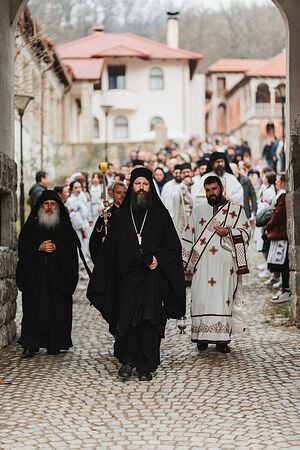 Brethren of the Draganac monastery It is now Lent. How can we overcome the anxiety “leaking out” of the latest news, and how can we retain inner peace in our un-peaceful time?
Brethren of the Draganac monastery It is now Lent. How can we overcome the anxiety “leaking out” of the latest news, and how can we retain inner peace in our un-peaceful time?
—We must have peace in our hearts, regardless of what happens in our lives. We must seek out such peace and strive for it. People often say to me, “You left the world to live in a monastery and it’s all calm and quiet there…” To be frank, when it comes to peace and quiet, I had a much quieter and calmer life when I was still living in the world. I actually had a rather comfortable lifestyle and I dealt with fewer people. I could also choose whom to meet with and what to do—a life full of pleasures. So, I had a cozy place by worldly standards. But this cozy little peace (what I call an external peace) is not what we should strive to gain. Peace in the world and the quiet of a monastery are different things. I experience true peace here in Draganac, because this is where I have discovered the meaning of my existence. There is no shortage of trials and temptations in the monastery—all of us monks are different people and had different lives before we came. We harbor different thoughts, ideas, and shortcomings; we have obediences, and we get to meet all kinds of people all the time. How many times did I want to give it all up and leave, but I felt, or my heart was telling me, that it was wrong, that God’s blessing was not on it, that I shouldn’t grumble. Later, I realized that despite all the temptations, this is where there is real peace and quiet. So, my advice would sound like this: A man should fight to acquire peace within.
There is a book entitled, Father Arseny, which I often re-read, recalling the stories from it. A Russian priest and Confessor, who was imprisoned in the Bolshevik GULAG, had experienced all the horrors of Soviet godlessness. But he had so much peace in his heart, and this peace saved him and those around him! I think that whenever someone is reading this book, he is convinced that inner peace is a matter of personal choice and personal commitment to Christ. To murmur, to curse, or to fight for peace in your heart—this is where our choice lies. We won’t achieve this without sufferings that deprive us of our comfort. The Acts of the Apostles tells us that through much tribulation we must enter into the Kingdom of God (Acts 14:22). No one promised that we would have “comfort” and wellbeing here on earth, which the those yapping TVs scream about non-stop—no, it is just the opposite! The world is replete with grief, suffering, wars—and who knows how much more of this we have left! We can’t observe it from here, and I’m certainly glad we can't. But what we can see is Christ Who Is before us. And if we hold onto Him, we will have already found salvation here on earth. Not just sometime in the future, when it’s time for us to go, but here and now—through the Holy Communion and confession… Hold on to Christ, please!
To murmur, to curse, or to fight for peace in your heart—this is where our choice lies
I can give you a recent example from the time of the pandemic of how someone followed Christ against all odds. An elderly lady named Stojanka from the village of Gornje Kusce, our regular parishioner, walked (!) across the hills and woods to Draganac, bypassing police security cordons to deliver fresh lettuce to the monastery. She walked about ten kilometers! She came, put the lettuce down, prayed outside of our church, and went back. On her way back, as we found out later, she also dug beds in our garden. As simple as that, doing it all by herself! She never said a word to anyone—she just came, prayed, and labored here. Isn’t this an ascetic feat? This is someone who can teach us about faithfulness to Christ, in my opinion. That is what our old women are like!
However, it must be said that it’s not just the older generation: Your charitable organization “Kosovsko Pomoravlje” has also been a really good example of preserving, or rather nurturing, the love for your neighbor. It seems to me that the young people, for whom active love is more important than career or fruitless dreams, are the future of Serbia. This is where the beauty of our country lies. We have people with whom we share our prayers, for whom we also pray, and who will join us to glorify the crucified but risen Christ. Greetings with Great Lent!

